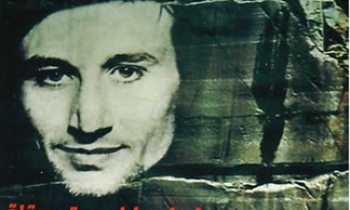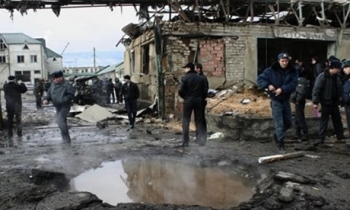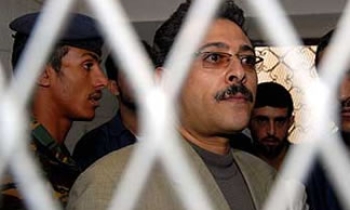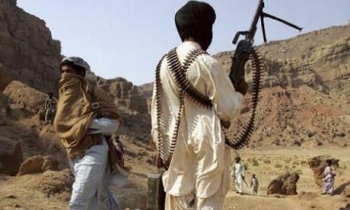SHARM EL SHEIK, Egypt - Middle East leaders looking to contain and weaken Hamas forces now controlling the Gaza Strip converged at this Red Sea resort Monday. But Hamas upstaged them by releasing the first recording of an Israeli soldier they captured a year ago, which had touched off a major Israeli intervention in Gaza.
The audiotape showing Israeli soldier Gilad Shalit, combined with the release of a new video from the Gaza Strip showing abducted BBC correspondent Alan Johnston wearing an explosive vest, overshadowed the modest Egyptian summit, which was meant to demonstrate support for Palestinian Authority President Mahmoud Abbas.
Israeli Prime Minister Ehud Olmert announced a plan to release 250 Palestinian prisoners from Abbas' Fatah party, but hedged the offer with conditions that all but ruled out freedom for any politically prominent detainees. While it will grab many headlines, Olmert's offer fell well short of expectations for a package of goodwill gestures, including lifting roadblocks around the West Bank.
Olmert and his government had earlier agreed to free tax funds they froze last year when Hamas took control of the Palestinian Authority.
Egyptian President Hosni Mubarak invited the leaders to participate in the meeting last week after Hamas seized military and political control of the Gaza Strip in a well-planned rout of fighters loyal to Abbas.
The summit was supposed to bolster Abbas with concrete new backing so that he could demonstrate significant international support to counter Hamas.
The United States also has agreed to restore aid to the Palestinian Authority, though none of the essential money from either country has started to flow. Israel has said that it wants to make sure there are safeguards so that the funds don't end up in the hands of Hamas.
After a day of one-on-one meetings, the four leaders gathered around a massive square conference table where they read individual statements before sitting down together for dinner.
''Hopes for peace have retreated between ebb and flow, progress and regress,'' Mubarak said. ''The peace process has also witnessed stagnation, but Egypt's efforts to achieve a breakthrough and an exit from this vicious cycle have not ceased.''
As they sought to aid Abbas, the Arab leaders also sought to avoid overtly alienating Hamas, even though Hamas leaders weren't invited to take part in the summit. The Arab leaders characterized the bloody Palestinian rivalry as a spat between ''brothers'' that could be settled peacefully.
As his Gaza forces crumbled, Abbas dissolved the fragile coalition government he helped create and installed a new pro-Western emergency Cabinet that now runs the Palestinian Authority.
While Hamas has rejected the emergency government as illegal, much of the international community, including the key players at Monday's summit, backed Abbas.
Hamas posted the 90-second tape of Shalit on one of its Web sites on the one-year anniversary of his capture, hours before the summit got under way. On it, Shalit says ''my health is deteriorating'' and that he needs ''a long stay in the hospital.''
Speaking in Hebrew with a slight French accent that allowed his family to identify his voice, the Israeli soldier also criticized his government for not meeting his captors' demands for the release of female and teenage Palestinian prisoners.
''I regret the indifference of the Israeli government and the army in this matter and their disregard for the demands of Izzadine al Qassam,'' he said in reference to the Hamas military wing. He appeared to be reading a statement.
Shalit was captured a year ago when Palestinian militants attacked an Israeli military outpost along the Gaza Strip border near Egypt. The attack sparked a summer-long Israeli military crackdown on Gaza and the Hamas-led government. But it failed to secure Shalit's release, and there was periodic speculation that the soldier might have been critically injured in the assault.
While his family received a letter from Shalit early in his captivity, Monday's tape marked the first significant indication that he was still alive.
Meanwhile, Hamas still faces internal challenges to its rule in Gaza. That point became clear on Monday when Palestinian militants holding the BBC correspondent released a videotape showing Johnston in a white explosive belt.
In the video posted on the Internet, Johnston warns that his captors have threatened to blow him up if Hamas fighters follow through on their vow to stage a military raid to try and free him.
''The situation now is very serious,'' Johnston says in the video. ''As you can see, I have been dressed in an explosive belt, which the kidnappers say will be detonated if there is any attempt to storm this area.''
Johnston was kidnapped on March 12 in Gaza City and is being held by the Army of Islam, a militant group believed to be headed by Mumtaz Dagmush, a member of a disruptive Palestinian family.









